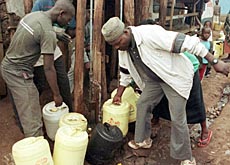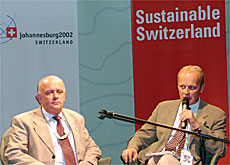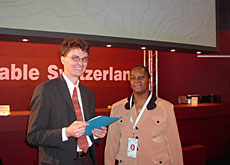Swiss boost aid to southern African famine victims

Switzerland is to stump up an additional SFr2 million to provide urgently needed food for famine victims in southern Africa.
The announcement came on Friday during a one-day Swiss-organised seminar on food security at the Earth summit in Johannesburg.
The funds – which are in addition to SFr3 million already made available by the Swiss Agency for Development and Cooperation (SDC) – will be used to buy grain for some of the estimated 13 million people currently at risk of starvation in southern Africa.
Walter Fust, SDC director and a senior negotiator at the summit, said the money would be channelled through the World Food Programme.
The decision to boost Swiss aid to the region came as a summit debate on how to combat hunger was overshadowed by a row over the use of genetically modified (GM) crops as food for famine victims.
While some countries believe GM crops may be a solution to world hunger, environmental groups gathered in Johannesburg have warned against their use.
Better crop yields
But at the Swiss food security seminar on the sidelines of the main summit talks, the focus of debate was on how to maximise yields from conventional crops.
“When you talk about food security, even genetically-modified material will not save the planet,” Fust told swissinfo.
“We need also to go for good production methods, adequate fertiliser, good soil and so on.”
Marianne Bänziger, a Zimbabwe-based researcher into crop productivity and guest speaker at the food security seminar, said urgent action was needed to combat starvation.
“It is a disaster that this is happening in the year 2002 with all the technology we have,” Bänziger said in an interview with swissinfo.
“Whenever I drive around rural areas [of Zimbabwe] I find people in the road waiting for food because they have heard that a lorry is coming,” she added.
“They are waiting, fainting, and you hear them dying.”
Drought-resistant maize
Bänziger – who works in Harare for the non-profit making International Maize and Wheat Improvement Centre – says one of the solutions to the widespread drought which has killed crops and left a trail of parched earth across southern Africa could be a new breed of so-called “drought-resistant” maize.
With the financial support of the SDC, Bänziger has conducted extensive research into the creation of a form of maize which has proven in tests to produce significantly higher yields than conventional corn.
“We used conventional [non-GM] breeding methodologies, which led to the development of varieties of maize which better tolerate drought,” Bänziger explained.
“In spite of the drought, this maize still yields sufficiently to feed a family,” she added.
Bänziger claims the yields of those farmers who have used the drought-resistant maize have increased by between 35 and 50 per cent.
Further tests are currently being made in a bid to develop a new breed of maize within the next decade which experts hope will return yields of over 50 per cent.
Dependence on aid
Scientists behind the new breed of maize say farmers who cultivate it need less in the way of humanitarian aid to help them survive until the following harvest.
“This could make a huge difference. A family which grows a conventional variety may not harvest enough to make it through the year,” says Bänziger, “and this means they have to depend on donor aid, which is humiliating.”
“But if they plant this different variety, they are likely to harvest enough to make it through to the following year.”
Bänziger says the additional income made through the sale of surplus grain can be used to pay for luxuries such as school fees and rudimentary health care.
Her message to heads of state preparing to arrive in Johannesburg for the climax of the summit next week is simple.
“The often-used phrase, ‘trade not aid’, says it all,” she says.
“Farmers in developing countries do not want aid, they just want a fair chance to make a living.”
swissinfo, Ramsey Zarifeh, Johannesburg
Switzerland has pledged an additional SFr2 million to the World Food Programme to help famine victims in southern Africa.
Conservative estimates suggest that at least 13 million people in the drought-stricken region are currently at risk from starvation.
Drought-resistant maize is being touted as a way of increasing crop yields by up to 50 per cent.

In compliance with the JTI standards
More: SWI swissinfo.ch certified by the Journalism Trust Initiative





You can find an overview of ongoing debates with our journalists here. Please join us!
If you want to start a conversation about a topic raised in this article or want to report factual errors, email us at english@swissinfo.ch.